|
Books Should Be Free Loyal Books Free Public Domain Audiobooks & eBook Downloads |
|
|
Books Should Be Free Loyal Books Free Public Domain Audiobooks & eBook Downloads |
|
Short Stories |
|---|
|
Book type:
Sort by:
View by:
|
By: Charles Dickens (1812-1870) | |
|---|---|
 Holiday Romance
Holiday Romance
| |
 To Be Read at Dusk
To Be Read at Dusk
| |
 Reprinted Pieces
Reprinted Pieces
| |
 Sketches of Young Couples
Sketches of Young Couples
| |
 Sketches of Young Gentlemen
Sketches of Young Gentlemen
| |
By: Charles E. Fritch (1927-) | |
|---|---|
 I Like Martian Music
I Like Martian Music
| |
 The Odyssey of Sam Meecham
The Odyssey of Sam Meecham
| |
By: Charles Fenno Hoffman (1806-1884) | |
|---|---|
 The Man In The Reservoir
The Man In The Reservoir
| |
By: Charles Franklin Carter | |
|---|---|
 Old Mission Stories of California
Old Mission Stories of California
| |
By: Charles Hanson Towne (1877-1949) | |
|---|---|
 The Best Short Stories of 1921 and the Yearbook of the American Short Story
The Best Short Stories of 1921 and the Yearbook of the American Short Story
| |
By: Charles Heber Clark (1841-1915) | |
|---|---|
 Frictional Electricity From "The Saturday Evening Post."
Frictional Electricity From "The Saturday Evening Post."
| |
By: Charles K. (Charles Kellogg) Field (1873-) | |
|---|---|
 Stanford Stories Tales of a Young University
Stanford Stories Tales of a Young University
| |
By: Charles Knight (1791-1873) | |
|---|---|
 Mind Amongst the Spindles
Mind Amongst the Spindles
Lowell Massachusetts was founded in the 1820s as a planned manufacturing center for textiles and is located along the rapids of the Merrimack River, 25 miles northwest of Boston. By the 1850s Lowell had the largest industrial complex in the United States. The textile industry wove cotton produced in the South. In 1860, there were more cotton spindles in Lowell than in all eleven states combined that would form the Confederacy. Mind Amongst the Spindles is a selection of works from the Lowell Offering, a monthly periodical collecting contributed works of poetry and fiction by the female workers of the textile mills... | |
By: Charles Louis Fontenay (1917-2007) | |
|---|---|
 Service with a Smile
Service with a Smile
| |
 The Jupiter Weapon
The Jupiter Weapon
| |
 Disqualified
Disqualified
| |
 The Gift Bearer
The Gift Bearer
| |
 Wind
Wind
| |
 Atom Drive
Atom Drive
| |
By: Charles Reade (1814-1884) | |
|---|---|
 Stories by English Authors: England
Stories by English Authors: England
| |
By: Charles Saphro | |
|---|---|
 Zero Data
Zero Data
| |
By: Charles V. De Vet (1911-1997) | |
|---|---|
 There is a Reaper ...
There is a Reaper ...
| |
 Monkey On His Back
Monkey On His Back
| |
 Vital Ingredient
Vital Ingredient
| |
By: Charlotte Niese (1854-1935) | |
|---|---|
 The Story Of The Little Mamsell
The Story Of The Little Mamsell
| |
By: Chas. A. Stopher | |
|---|---|
 Solar Stiff
Solar Stiff
| |
By: Clara Dillingham Pierson (1868-1952) | |
|---|---|
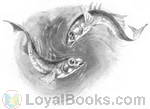 Among the Pond People
Among the Pond People
Lovely book for children written by teacher and naturalist Clara Dillingham Pierson. This book in the "Among the People" series explores the animal inhabitants of a pond. The beautiful writing brings the pond creatures into being in the reader's imagination and allows them a glimpse of the mysterious lives being carried out above and below the water's surface. | |
By: Clifford D. Simak (1904-1988) | |
|---|---|
 The Street That Wasn't There
The Street That Wasn't There
| |
By: D. H. Lawrence (1885-1930) | |
|---|---|
 The Prussian Officer
The Prussian Officer
| |
 Wintry Peacock
Wintry Peacock
| |
By: Damon Francis Knight (1922-2002) | |
|---|---|
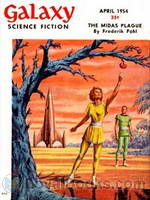 Special Delivery
Special Delivery
| |
By: Dandin (6th Century) | |
|---|---|
 Twenty Two Goblins
Twenty Two Goblins
These 22 stories are told by the Goblin to the King Vikram. King Vikram faces many difficulties in bringing the vetala to the tantric. Each time Vikram tries to capture the vetala, it tells a story that ends with a riddle. If Vikram cannot answer the question correctly, the vampire consents to remain in captivity. If the king answers the question correctly, the vampire would escape and return to his tree. In some variations, the king is required to speak if he knows the answer, else his head will burst... | |
By: Dave Dryfoos (1915-2003) | |
|---|---|
 Waste Not, Want
Waste Not, Want
| |
 Tree, Spare that Woodman
Tree, Spare that Woodman
| |
By: David Carpenter Knight | |
|---|---|
 The Love of Frank Nineteen
The Love of Frank Nineteen
| |
By: David Henry Keller (1880-1966) | |
|---|---|
 The Rat Racket
The Rat Racket
| |
By: David Mason | |
|---|---|
 Something Will Turn Up
Something Will Turn Up
| |
By: Demetrios Vikelas (1835-1908) | |
|---|---|
 Stories by Foreign Authors: Polish, Greek, Belgian, Hungarian
Stories by Foreign Authors: Polish, Greek, Belgian, Hungarian
| |
By: Desmond Winter Hall (1909-1992) | |
|---|---|
 A Scientist Rises
A Scientist Rises
| |
By: Dick Purcell | |
|---|---|
 Mr. Chipfellow's Jackpot
Mr. Chipfellow's Jackpot
| |
By: Don Berry | |
|---|---|
 Sound of Terror
Sound of Terror
| |
By: Don Peterson | |
|---|---|
 The White Feather Hex
The White Feather Hex
| |
By: Don Thompson (1935-1994) | |
|---|---|
 High Dragon Bump
High Dragon Bump
| |
By: Donald E. Westlake (1933-) | |
|---|---|
 They Also Serve
They Also Serve
| |
By: Douglass Sherley (1857-1917) | |
|---|---|
 Love Instigated: The Story of a Carved Ivory Umbrella Handle
Love Instigated: The Story of a Carved Ivory Umbrella Handle
| |
By: E. G. von Wald | |
|---|---|
 Shock Absorber
Shock Absorber
| |
By: Eando Binder | |
|---|---|
 Shipwreck in the Sky
Shipwreck in the Sky
| |
By: Ed M. Clinton (1926-2006) | |
|---|---|
 Untechnological Employment
Untechnological Employment
| |
By: Eden Phillpotts (1862-1960) | |
|---|---|
 Human Boy Again
Human Boy Again
Published in 1908, this is a further collection of twelve humorous short stories about English school boys. The author wrote two other books in this series: The Human Boy and The Human Boy And The War . Eden Phillpotts was popular with the reading public and wrote prolifically novels, short stories, poetry, plays, and nonfiction. - Summary by David Wales | |
By: Edgar Allan Poe (1809-1849) | |
|---|---|
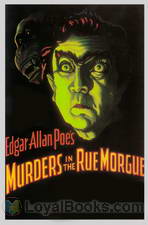 The Murders in the Rue Morgue
The Murders in the Rue Morgue
This story opens with a mother and daughter found brutally murdered inside a locked room in an upstairs apartment on a street in Paris. The police are baffled by both the ferocity of the crime and the lack of clues. Neighbors give conflicting evidence. Two friends are intrigued by the entire situation as reported in the newspapers. They decide to do a little investigating on their own. What they come up with is one of the most shocking and strangest of conclusions. The Murders in the Rue Morgue by Edgar Allan Poe is perhaps the first modern detective tale, though similar stories by Voltaire and ETA Hoffman did appear a few decades earlier... | |
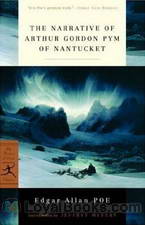 Narrative of Arthur Gordon Pym
Narrative of Arthur Gordon Pym
Published in 1838, The Narrative of Arthur Gordon Pym of Nantucket is Poe’s only complete novel and concentrates on several sea adventures gone awry. The novel follows Arthur Gordon Pym, who finds himself in the center of gloomy occurrences on board numerous vessels, as his anticipated sea adventure takes a drastic shift in the wind. Shipwreck, starvation, mutiny, near death experiences and cannibalism are just some of the issues endured in the gripping, and at times gruesome novel. The adventure... | |
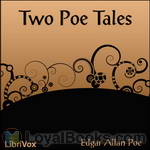 Two Poe Tales
Two Poe Tales
Edgar Allan Poe is best known for his famous short horror stories; however, horror is not the only genre in which he wrote. How To Write a Blackwood Article and its companion piece A Predicament are satirical works exploring the pieces of the formula generally seen in short horror stories (”articles”) found in the Scottish periodical “Blackwood’s Magazine” and the successful misapplication of said formula by – horrors! – a woman author! – respectively. | |
 The Fall of the House of Usher
The Fall of the House of Usher
| |
By: Edgar Pangborn (1909-1976) | |
|---|---|
 The Good Neighbors
The Good Neighbors
| |
By: Edgar Rice Burroughs (1875-1950) | |
|---|---|
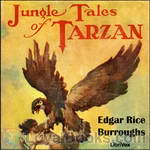 Jungle Tales of Tarzan
Jungle Tales of Tarzan
Jungle Tales of Tarzan is a collection of twelve loosely-connected short stories written by Edgar Rice Burroughs, comprising the sixth book in order of publication in his series about the title character Tarzan. Chronologically, the events recounted in it actually occur between chapters 12 and 13 of the first Tarzan novel, Tarzan of the Apes. | |
By: Edith Nesbit (1858-1924) | |
|---|---|
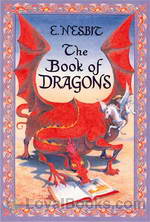 The Book of Dragons
The Book of Dragons
Eight enchanting tales about a variety of whimsical dragons, by a master of the craft, E Nesbit, are contained in this absolutely delightful volume, The Book of Dragons. While it's essentially meant for children, there are plenty of adults who will find it irresistible enough to peek into and a most charming way to spend a magical hour. Beautifully illustrated by the enormously talented Harold Robert Millar, the Scottish designer and illustrator famed for his unique and imaginative illustrations, The Book of Dragons is sure to delight both first time readers of the unique writer Edith Nesbit and those who have found pleasure in her other works... | |
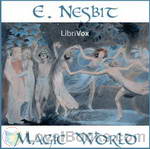 The Magic World
The Magic World
Talking cats, birds, fish and bells, wicked fairies, uglified princesses – adventure, magic, and more magic. A delightful collection of stories for children of all ages. The Magic World is an influential collection of twelve short stories by E. Nesbit. It was first published in book form in 1912 by Macmillan and Co. Ltd., with illustrations by H. R. Millar and Gerald Spencer Pryse. The stories, previously printed in magazines (like Blackie’s Children’s Annual), are typical of Nesbit’s arch, ironic, clever fantasies for children. | |
 In Homespun
In Homespun
| |
By: Edith Wharton (1862-1937) | |
|---|---|
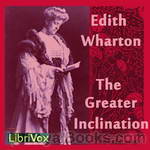 The Greater Inclination
The Greater Inclination
This is Edith Wharton's earliest published collection of short stories (1899). Like much of her later work, they touch on themes of marriage, male/female relationships, New York society, and the nature and purpose of art. One of the stories, "The Twilight of the God," is written as a short play. The role of Warland is read by mb, and the role of Oberville by Bruce Pirie. | |
 Crucial Instances
Crucial Instances
This is Edith Wharton's second published collection of short stories (1901). One of these seven stories, "Copy: A Dialogue," is written as a short play. The role of Hilda is read by Arielle Lipshaw, and the role of Ventnor by Mark F. Smith. | |
 The Early Short Fiction of Edith Wharton — Part 1
The Early Short Fiction of Edith Wharton — Part 1
| |
 Tales of Men and Ghosts
Tales of Men and Ghosts
Tales of Men and Ghosts was published as a collection in 1910, though the first eight of the stories had earlier appeared in Scribner's and the last two in the Century Magazine. Despite the title, the men outnumber the ghosts, since only "The Eyes" and "Afterward" actually call on the supernatural. In only two of the stories are women the central characters, though elsewhere they play important roles. Wharton enjoys subjecting her subjects -- all of them American gentlemen and gentlewomen, in the conventional senses of the word -- to various moral tests and sometimes ironic tests... | |
 The Descent of Man and Other Stories
The Descent of Man and Other Stories
| |
 The Hermit and the Wild Woman
The Hermit and the Wild Woman
| |
 Coming Home 1916
Coming Home 1916
| |
 The Triumph Of Night 1916
The Triumph Of Night 1916
| |
 Kerfol 1916
Kerfol 1916
| |
 The Choice 1916
The Choice 1916
| |
 Autres Temps... 1916
Autres Temps... 1916
| |
By: Edmond Hamilton | |
|---|---|
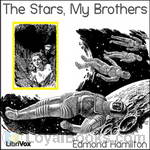 The Stars, My Brothers
The Stars, My Brothers
Edmond Hamilton (1904 – 1977) had a career that began as a regular and frequent contributor to Weird Tales magazine. The first hardcover publication of Science Fiction stories was a Hamilton compilation, and he and E.E. “Doc” Smith are credited with the creation of the Space Opera type of story. He worked for DC Comics authoring many stories for their Superman and Batman characters. Hamilton was also married to fellow author Leigh Brackett. – Published in the May, 1962 issue of Amazing Stories “The Stars, My Brothers” gives us a re-animated astronaut plucked from a century in the past and presented with an alien world where the line between humans and animals is blurred. | |
 The Man Who Saw the Future
The Man Who Saw the Future
| |
By: Edmund H. Leftwich | |
|---|---|
 The Bell Tone
The Bell Tone
| |
By: Edmund Mitchell (1861-1917) | |
|---|---|
 Tales of Destiny
Tales of Destiny
| |
By: Edna Ferber (1865-1968) | |
|---|---|
 Buttered Side Down
Buttered Side Down
"And so," the story writers used to say, "they lived happily ever after." Um-m-m—maybe. After the glamour had worn off, and the glass slippers were worn out, did the Prince never find Cinderella's manner redolent of the kitchen hearth; and was it never necessary that he remind her to be more careful of her finger-nails and grammar? After Puss in Boots had won wealth and a wife for his young master did not that gentleman often fume with chagrin because the neighbors, perhaps, refused to call on the lady of the former poor miller's son? It is a great risk to take with one's book-children... | |
 One Basket
One Basket
This sparkling collection of 7 short stories by Ferber including some that are considered her all time best like The Woman Who Tried To be Good and The Maternal Feminine. Writing for and about women, Edna Ferber touches the very heart and soul of what it means to be human; to make good choices and bad; to be weak and strong. This was a very popular book when published in 1913 | |
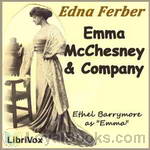 Emma McChesney and Company
Emma McChesney and Company
This is the final volume in the trilogy following the smart, stylish, divorced and independent businesswoman Emma McChesney in her career from stenographer, then drummer (traveling salesman) to owner of her own company. (The first was Roast Beef, Medium and the second Personality Plus). Edna Ferber first gained success with these stories and later went on to write Show Boat, Giant and other well known books. First published in 1915, Emma's son, Jock, has moved to Chicago with his new wife. Emma decides to sell in South America and proves she has not lost her magic touch... | |
By: Edna Lyall (1857-1903) | |
|---|---|
 The Autobiography of a Slander
The Autobiography of a Slander
The Autobiography of a Slander exposes the consequences of reckless words or, even worse, intentionally disparaging words. In this moral tale, told from the point of view of "the slander", Edna Lyall (pseudonym used by Ada Ellen Bayley) reveals her ideals and goals in life and relationships. | |
By: Edward Eggleston (1837-1902) | |
|---|---|
 Queer Stories for Boys and Girls
Queer Stories for Boys and Girls
| |
 Duffels
Duffels
| |
By: Edward Everett Hale (1822-1909) | |
|---|---|
 The Man Without a Country and Other Tales
The Man Without a Country and Other Tales
| |
 The Brick Moon and Other Stories
The Brick Moon and Other Stories
| |
 If, Yes and Perhaps Four Possibilities and Six Exaggerations with Some Bits of Fact
If, Yes and Perhaps Four Possibilities and Six Exaggerations with Some Bits of Fact
| |
By: Edward G. Robles | |
|---|---|
 See?
See?
| |
By: Edward Joseph Harrington O'Brien (1890-1941) | |
|---|---|
 The Best Short Stories of 1917 and the Yearbook of the American Short Story
The Best Short Stories of 1917 and the Yearbook of the American Short Story
| |
 The Best Short Stories of 1915 And the Yearbook of the American Short Story
The Best Short Stories of 1915 And the Yearbook of the American Short Story
| |